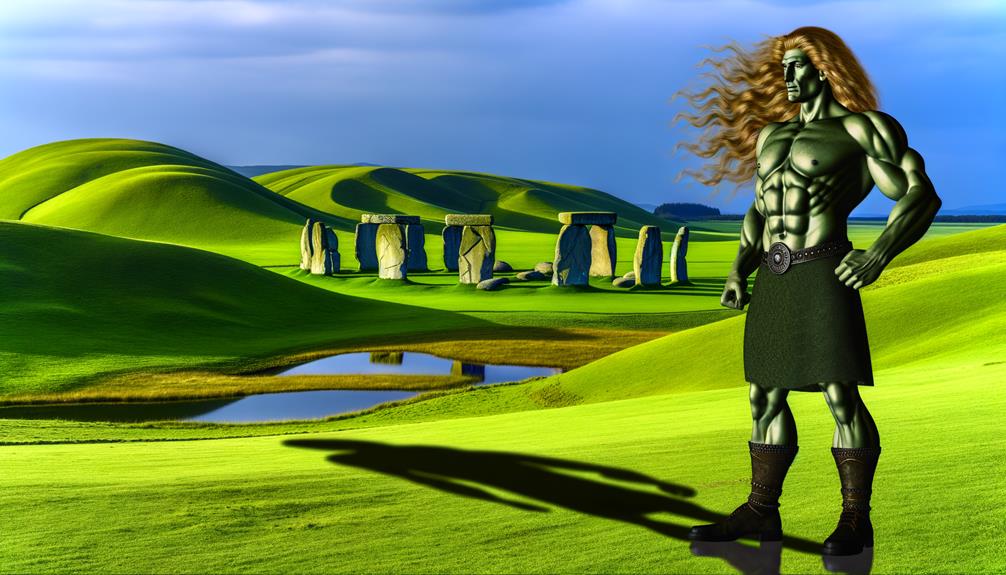Meaning of the Name Keegan
The name Keegan originates from Ireland and is derived from the Gaelic surname Mac Aodhagáin, meaning 'son of Aodhagáin'. Aodhagáin is a diminutive form of Aodh, which translates to 'fire', signifying warmth, passion, and life force.
The suffix '-agáin' implies endearment and smallness, reflecting emotional nuances in Gaelic nomenclature. Through adaptation, Keegan progressed from a surname to a widely recognized given name, maintaining its unique cultural resonance.
Increasingly seen as gender-neutral, Keegan embodies strength and friendliness. Explore the name's historical and contemporary significance, along with its cyclical popularity and notable bearers, for a deeper understanding.

Key Takeaways
- The name Keegan originates from Ireland and is derived from the Gaelic surname Mac Aodhagáin.
- Mac Aodhagáin translates to 'son of Aodhagáin,' with Aodh meaning 'fire.'
- The name Aodhagáin reflects warmth, passion, and life force, signifying emotional significance in Gaelic culture.
- Keegan has evolved from a Gaelic surname to a widely recognized given name with gender-neutral appeal.
- The name embodies Irish heritage, historical lineage, and contemporary cultural resonance.
Origin of Keegan
The name Keegan originates from Ireland and is derived from the Gaelic surname Mac Aodhagáin, which translates to 'son of Aodhagáin.' This etymology is rooted in the Gaelic language, where 'Mac' signifies 'son of,' and 'Aodhagáin' is a diminutive form of Aodh, meaning 'fire' or 'fiery one.'
Historically, the name was borne by families in the medieval provinces of Leinster and Connacht. The transformation from Mac Aodhagáin to Keegan reflects the Anglicization processes that many Gaelic names underwent. This name encapsulates both a rich linguistic heritage and a glimpse into the familial structures of ancient Ireland.
Keegan, thereby, symbolizes not just a lineage but also the cultural interplay between Gaelic traditions and Anglicized adaptations.
Gaelic Roots
Rooted deeply in the linguistic traditions of the Gaelic language, Keegan encapsulates the phonetic and semantic intricacies inherent to its Celtic origins.
Derived from the Old Gaelic surname Mac Aodhagáin, it showcases the characteristic Gaelic prefix 'Mac', meaning 'son of', which was commonly used in patronymic naming conventions.
The latter part, 'Aodhagáin', is a diminutive form of Aodh, a traditional Gaelic name meaning 'fire'.
This etymological structure not only highlights the importance of familial lineage in Gaelic culture but also emphasizes the poetic and often symbolic nature of Gaelic nomenclature.
The name Keegan, thus, serves as a linguistic artifact, preserving the cultural and historical essence of its Gaelic heritage in a compact, resonant form.
Meaning of Aodhagán
Exploring the meaning of 'Aodhagán' reveals a nuanced interplay between language and symbolism. This diminutive form of 'Aodh' encapsulates the concept of 'little fire' within Gaelic traditions. Linguistically, 'Aodh' translates to 'fire,' a term steeped in ancient Celtic culture and mythology, symbolizing warmth, passion, and life force.
The suffix '-agán' further diminishes 'Aodh,' rendering it a term of endearment or smallness. This transformation turns the robust image of fire into a more approachable, affectionate symbol. This intricate linguistic construction highlights how Gaelic names reflect both physical elements and emotional significance.
The name 'Aodhagán' conveys not only the primal essence of fire but also a sense of intimacy and familial affection, enriching its cultural resonance.
Historical Context
The name Keegan, rooted in Gaelic origins, traces its lineage to the ancient name Aodhagán, reflecting the linguistic and cultural shifts over centuries.
Analyzing the evolution of Keegan reveals how historical influences and migrations have shaped its modern form and usage.
Today, the name carries significant cultural resonance, embodying both historical heritage and contemporary identity.
Gaelic Name Origins
In delving into the Gaelic origins of the name Keegan, it becomes evident that its etymology is steeped in rich historical and linguistic traditions, dating back to ancient Ireland.
Originating from the Old Gaelic 'Mac Aodhagáin,' the name Keegan translates to “son of Aodhagán,” with “Aodh” signifying “fire” or “fiery one.” The suffix “-án” is a diminutive, rendering “Aodhagán” akin to “little fire.”
This nomenclature reflects the ancient Irish practice of patronymics, wherein names indicate lineage. The use of 'Mac' further underscores its Gaelic roots, denoting “son of.” Such linguistic intricacies reveal not only familial connections but also cultural reverence for elemental forces, encapsulating the heritage and identity inherent in the name Keegan.
Name Evolution Over Time
Tracing the historical trajectory of the name Keegan reveals how its Gaelic origins have adapted and evolved through various cultural and linguistic influences over centuries. Initially derived from the Gaelic 'Mac Aodhagáin,' meaning 'son of Aodhagán' (a diminutive of Aodh, or 'fire'), the name underwent several transformations.
During English colonization, many Gaelic names were Anglicized for ease, morphing 'Mac Aodhagáin' into 'Keegan.'
Phonetic shifts, pronunciation changes over time, led to further variations, including 'Keagan' and 'Kegan.'
Migration played a significant role as the name spread globally, particularly to the United States and Australia, influencing its adaptation.
Documentation, from written records in the Middle Ages to modern censuses, reflects these changes, providing a rich tapestry of its evolution.
This intricate evolution underscores the dynamic nature of linguistic heritage.
Cultural Significance Today
Keegan's modern cultural significance is deeply rooted in its historical Gaelic origins and the subsequent transformations it has undergone through Anglicization and global migration.
Derived from the Gaelic 'Mac Aodhagáin,' meaning 'son of Aodhagán,' the name reflects a rich heritage tied to ancient Irish clans.
The Anglicization process simplified pronunciation and spelling, facilitating its adoption beyond Ireland.
Today, Keegan is recognized in various countries, symbolizing both a connection to Irish ancestry and a contemporary, global identity.
The name's endurance and adaptability underscore its linguistic and cultural fluidity, resonating with those who appreciate its historical depth and modern appeal.
This confluence of tradition and modernity enables Keegan to maintain relevance across diverse cultural landscapes.
Evolution Into a Given Name
The evolution of Keegan from a surname to a given name is rooted in its historical origins, which trace back to the Gaelic 'Mac Aodhagáin,' meaning 'son of Aodhagán.' This progression was influenced by cultural adoption trends, particularly as Irish names gained popularity in English-speaking countries.
Contemporary factors, such as the global appeal of distinctive and heritage-rich names, have further solidified Keegan's status as a favored given name.
Historical Name Origins
Emerging from its Gaelic roots, the name Keegan has undergone significant transformation, evolving from an ancient surname to a widely recognized given name.
The original form, 'Ó Ceagáin,' signifies 'descendant of Aodhagán,' where 'Aodhagán' is a diminutive of 'Aodh,' meaning 'fire.' This evolution reflects a shift from traditional clan-based identities to individual naming practices.
Key linguistic metamorphoses include:
- Phonetic Anglicization: Simplification of the original Gaelic pronunciation.
- Surname to Forename Shift: Adoption of Keegan as a first name in English-speaking countries.
- Cultural Exchanges: Influence of Irish diaspora on name adoption.
- Literary and Media Influence: Increased visibility through literature and media, enhancing its popularity.
These changes highlight the dynamic nature of name evolution, shaped by historical, cultural, and linguistic factors.
Cultural Adoption Trends
As the historical roots of the name Keegan reveal its transformation from a clan-based surname to a modern given name, its cultural adoption trends underscore the broader societal shifts in naming conventions influenced by migration, media, and evolving identity norms.
Initially rooted in Irish Gaelic, the name Keegan has traversed cultural boundaries, particularly through the diaspora of Irish communities globally. This migration facilitated the name's incorporation into various linguistic and cultural contexts, further popularized by its appearances in literature and media.
Additionally, the evolving emphasis on individualism and unique identity in the contemporary era has encouraged the repurposing of surnames as first names, making Keegan a prominent example. This evolution reflects the dynamic interplay between tradition and modernity in personal naming practices.
Modern Popularity Factors
Keegan's rise in modern popularity as a given name can be attributed to a confluence of factors. One key aspect is its phonetic appeal, characterized by a euphonic quality with soft consonants and balanced vowels that make it particularly pleasing to the ear.
Another contributing factor to Keegan's popularity is its intrinsic cultural resonance. Often associated with Irish heritage, the name adds a layer of depth and identity to those who bear it. This connection to Irish roots enriches the significance of the name in a broader cultural context.
Furthermore, Keegan's popularity is bolstered by the broader trend of surname repurposing in contemporary naming conventions. This trend reflects a modern approach to naming practices, where surnames are adapted for use as first names, adding a sense of uniqueness and individuality to the naming process.
Additionally, increased visibility through popular culture and media influence has further propelled Keegan into the spotlight as a favored given name. These various factors collectively contribute to Keegan's growing favor among parents seeking a distinctive and culturally resonant name for their children.
Popularity Over Time
The name Keegan has experienced fluctuating levels of popularity over the decades, influenced by cultural trends, media representation, and shifting naming conventions.
Initially rooted in Irish heritage, its usage saw a steady rise in the late 20th century, paralleling the increasing fascination with unique and ethnically diverse names.
During the 1990s and early 2000s, Keegan gained momentum, partly due to its appearance in popular media and the broader trend of adopting surnames as first names.
However, as naming fashions evolved, the name's prominence experienced a decline.
Analyzing naming databases reveals that Keegan's popularity is cyclical, often spiking in correlation with high-profile public figures or characters bearing the name.
Nonetheless, its enduring appeal lies in its distinctive sound and cultural resonance.
Cultural Significance
Rooted deeply in Irish heritage, the name Keegan carries significant cultural weight, reflecting a rich history and linguistic evolution that transcends mere etymology. The name, derived from the Gaelic 'Mac Aodhagáin,' meaning 'descendant of Aodhagán,' encapsulates elements of Irish identity and lineage. It offers a window into the socio-cultural fabric of Ireland, embodying:
- Historical Significance: Tracing back to ancient Gaelic clans, Keegan speaks to the ancestral narratives that underpin Irish society.
- Linguistic Richness: The etymological roots showcase the Gaelic language's complexity and poetic nature.
- Cultural Identity: The name serves as a marker of Irish heritage, often evoking pride and a sense of belonging.
- Symbolic Resonance: Keegan symbolizes continuity and tradition within Irish communities.
This profound cultural significance enhances its contemporary relevance.
Famous Keegans
Among the notable individuals who bear the name Keegan, one finds a diverse array of figures spanning various fields such as sports, entertainment, and literature, each contributing to the name's modern-day recognition and cultural resonance.
In sports, Kevin Keegan, a former English footballer and manager, is a prominent figure whose illustrious career has left an indelible mark on the sport.
In the world of entertainment, Keegan-Michael Key, an American actor and comedian, has gained acclaim for his work in television and film, significantly enhancing the cultural cachet of the name.
Additionally, John Keegan, a renowned British military historian and author, has made substantial contributions to literature, ensuring that the name Keegan is also associated with intellectual achievement.
Modern Usage
Beyond the world of notable individuals, the name Keegan has evolved in modern usage to embrace a versatile and contemporary appeal, reflecting broader societal trends in naming conventions. This evolution is marked by its increasing popularity across various cultures and its adoption for both genders. Linguistically, the name's phonetic simplicity and rhythmic cadence make it appealing.
Analyzing current trends reveals several key factors driving its modern usage:
- Gender-neutral appeal: Keegan is increasingly chosen for both boys and girls.
- Cultural versatility: The name is embraced in diverse cultural contexts.
- Unique yet familiar: It strikes a balance between being distinctive and easy to recognize.
- Positive associations: Connotations of strength and friendliness enhance its desirability.
These elements collectively underscore Keegan's modern relevance.
Conclusion
The name Keegan, rooted in Gaelic heritage, symbolizes a torchbearer of history and tradition. Derived from Aodhagán, meaning 'little fire,' it encapsulates the enduring spirit of its bearers.
Over centuries, Keegan has evolved from a surname to a cherished given name, reflecting its growing cultural significance. Its sustained popularity and the prominence of notable individuals named Keegan underscore its lasting impact.
Therefore, the name Keegan stands as a beacon of linguistic and cultural continuity.






